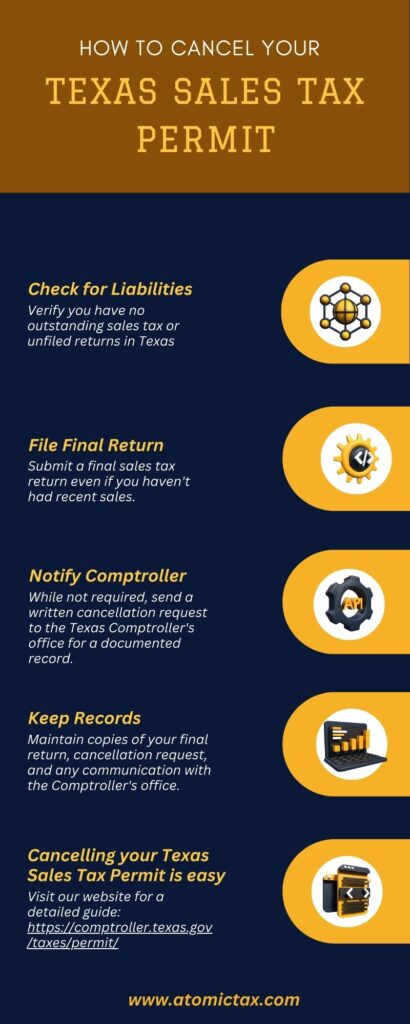To get a sales tax license in Texas – you can choose to register online for faster processing or download a paper application. However, before you begin, gather necessary information like your EIN, business details, and contact information. Once you have everything ready, head to the Texas Comptroller’s website to initiate the online registration or complete the paper form. After submitting your application, allow a few business days for online processing, while mailed applications may take longer. Upon approval, you’ll receive your sales tax permit electronically or by mail, allowing you to collect sales tax on taxable goods sold to Texas customers.
Remember, permit renewal are required every two years to maintain compliance. Now, let’s get into this guide.
Register & Get Your Sales Tax Permit in Texas Faster: A Step-by-Step Guide Explained
Running a successful e-commerce business in Texas involves following various regulations, and one of the most important is obtaining a sales tax permit. This permit allows you to collect and remit sales tax on taxable goods sold to Texas customers. Failing to comply with sales tax regulations can result in penalties and late fees, so understanding the process is crucial.
Who Needs a Sales Tax Permit in Texas
Here’s a breakdown of who typically needs a sales tax permit in Texas:
- Businesses with physical presence in Texas: This includes brick-and-mortar stores, warehouses storing inventory within the state, or even having employees working remotely in Texas.
- Online businesses exceeding a sales threshold: Texas doesn’t specify a concrete sales threshold, but if you make a substantial amount of sales into the state, you may establish nexus and require a permit.
- Marketplaces facilitating sales: If you operate an online marketplace where third-party sellers make sales to Texas customers, you might have sales tax collection and remittance responsibilities depending on the specific marketplace facilitator tax (MFT) laws in Texas.
In Texas, not every business needs a sales tax permit. It boils down to a concept called “nexus,” which essentially means having a sufficient connection with the state that obliges you to collect and remit sales tax on taxable goods sold to Texas customers.
Sometimes, for online businesses, physical presence isn’t always required to trigger the sales tax nexus in Texas. In Texas, nexus can be established by having inventory stored in the state, having employees working remotely in Texas, or exceeding a certain amount of sales into the state.
How to Register for a Sales Tax Permit in Texas
The Texas Comptroller of Public Accounts offers two convenient methods to register for a sales tax permit and here’s a breakdown of the registration process:
Step 1: Determine Your Registration Method
The Texas Comptroller of Public Accounts offers two convenient options for registering:
- Online Registration (Recommended): This is the faster and more efficient method. Head to the Texas Comptroller’s website and navigate to the “Texas Sales and Use Registration” section.
- Paper Application: If you prefer a physical form, download and print the Texas Application for Sales and Use Tax Permit (Form AP-201) from the Comptroller’s website.
Step 2: Gather Required Information
Before you begin the application process, ensure you have the necessary documents and information on hand. Here’s a checklist:
- Your Social Security number or Employer Identification Number (EIN): This is used to identify your business for tax purposes.
- Texas taxpayer number (if you have one): If you’ve previously filed taxes in Texas, you’ll have this number.
- Business details: This includes your legal business name, structure (sole proprietorship, LLC, etc.), and business address.
- Contact information: Provide your business phone number, email address, and any other relevant contact details.
- Principal owner’s information: This includes the name and contact information of the primary owner of the business.
Step 3: Complete the Application
For Online Registration:
- Visit the Texas Comptroller’s website and create an online profile.
- Navigate to the “Texas Sales and Use Registration” section.
- Follow the prompts and provide the required information gathered in Step 2.
- Review your application thoroughly before submitting it electronically.
For Paper Application:
- Fill out the downloaded Form AP-201 completely and accurately.
- Double-check your entries for any errors or missing information.
- Mail the completed form to the address provided on the application.
Step 4: Wait for Processing
The processing time for online applications is generally faster than mailing a paper application. Online applications typically take a few business days to be processed, while mailed applications may take longer.
Step 5: Receive Your Permit
Once your application is approved, you’ll receive your sales tax permit electronically (for online applications) or via mail (for paper applications).
Congratulations! You’re now registered to collect and remit sales tax on taxable sales within Texas. Remember to keep your permit up-to-date and renew it every two years to stay compliant with state regulations.
Read Also: How to Get a Vendor License in Texas
What Information Do You Need to Register for Sales Tax License in Texas
Here’s a list of documents and information you’ll likely need for your application:
- Your Social Security number or Employer Identification Number (EIN)
- Texas taxpayer number (if you have one)
- Business name and legal structure
- Business address and contact information
- Principal owner’s name and contact information
How Much Does it Cost to Apply for a Sales Tax Permit in Texas
There is no upfront fee to apply for a sales tax permit in Texas. However, you are responsible for collecting and remitting sales tax on all taxable sales.
How Long does it Take to Receive your Texas Sales Tax Permit
The processing time for online applications is generally faster than mailing a paper application, typically taking a few business days.
Do I Need to Renew My Sales Tax Permit in Texas
Yes, Texas sales tax permits need to be renewed every two years. The Comptroller’s office will send you a renewal notice before your permit expires.
Read Also: Is a Texas Sales Tax Permit the Same as a Resale Certificate?
How to Cancel Sales Tax Permit in Texas
Cancelling your Texas sales tax permit involves a few key steps. First, ensure you have no outstanding tax liabilities or unfiled returns by checking with the Texas Comptroller’s website. Then, file a final sales tax return even if you haven’t had recent sales. Finally, to solidify the cancellation, notify the Comptroller’s office in writing of your intent to cancel. While not mandatory, written notification creates a clear record. Remember to keep copies of your final return, cancellation request, and any correspondence for future reference
Below are more detailed and specific steps to follow to ensure it’s properly closed on their end

1. Check for Outstanding Tax Liabilities
Before canceling your permit, it’s crucial to ensure you have no outstanding sales tax liabilities in Texas. This includes any unfiled returns or unpaid taxes. The Texas Comptroller’s website offers resources to check your account status and file any past-due returns.
2. File Final Sales Tax Return
Even if you haven’t conducted any recent sales, you’ll need to file a final sales tax return to indicate you’re no longer operating in Texas. The Comptroller’s website provides instructions and resources for filing your final return electronically.
3. Notify the Texas Comptroller
Once you’ve settled any outstanding liabilities and filed your final return, it’s recommended to notify the Texas Comptroller’s office in writing of your intent to cancel your permit. While not mandatory, this provides a clear record of your cancellation request. You can send a written notification to the address provided on the Comptroller’s website or contact them directly to inquire about alternative cancellation methods.
4. Maintain Records
Keep copies of your final sales tax return, cancellation request, and any related correspondence with the Comptroller’s office for your records. This documentation can be helpful in case of any future inquiries.
Important Note: Even after canceling your permit, you might still be responsible for unfiled or unpaid taxes incurred before the cancellation date. Ensure you address any outstanding liabilities to avoid penalties or collection actions from the Texas Comptroller’s office.
Texas Sales Tax Permit Frequently Asked Questions (FAQ)
Does one texas sales tax permit cover multiple businesses?
No, you need a separate sales tax permit for each business you operate in Texas.
What happens to my Texas seller’s permit if I sell my business?
The new owner will need to obtain their own sales tax permit. You can cancel your permit once the sale is finalized by notifying the Comptroller’s office.
Is sales tax permit the same as a resale permit in Texas?
A sales tax permit allows you to collect sales tax from customers, while a resale permit allows you to purchase goods tax-free for resale with sales tax applied at the point of sale.
Does the Texas sales tax permit expire?
Yes, Texas sales tax permits expire every two years and need to be renewed.
How long will It take to receive my sales tax permit in Texas?
The processing time for your Texas sales tax permit depends on the method you choose to register: For online registration, it is generally the faster option, with processing times typically taking a few business days after submitting your application, while for paper applications, it can take longer than online registration.
Can my sales tax license application be delayed or rejected?
Yes, there’s a chance your application might be delayed or even rejected. Here are some common reasons:
- Incomplete or inaccurate information: Ensure you provide all the required information accurately on your application. Double-check for any typos or missing details before submitting.
- Missing documents: Make sure you have all the necessary documents attached to your application, such as proof of your business structure or your EIN.
- Verification issues: The Texas Comptroller’s office might need to verify some information on your application, which can cause a delay.
To minimize the risk of delays or rejections, it’s crucial to be thorough and provide accurate information during the application process.
Additional Resources
For more information on Texas sales tax regulations and the application process, visit the Texas Comptroller of Public Accounts website: https://comptroller.texas.gov/
Looking for a more detailed guide that explains and breaks down everything about Texas sales tax? Read our guide on Texas Sales and Use Tax Permit Guide for Ecommerce Sellers
Tip! Always be prepared for an audit with a sales tax audit checklist.
Conclusion
Obtaining a sales tax permit is a crucial step for e-commerce businesses operating in Texas. By following this guide and understanding your sales tax nexus, you can ensure your business remains compliant with state regulations. Remember, staying compliant helps you avoid penalties and allows you to focus on growing your online business.
Optional: How AtomicTaX Can Help
If you’re looking to simplify the sales tax registration process and ensure accuracy, AtomicTaX can help. Our services can help you gather necessary information, navigate the application process, and minimize the risk of delays or rejections. With AtomicTax, you can focus on running your business while our automated sales tax software handles the sales tax complexities and compliance for you.



